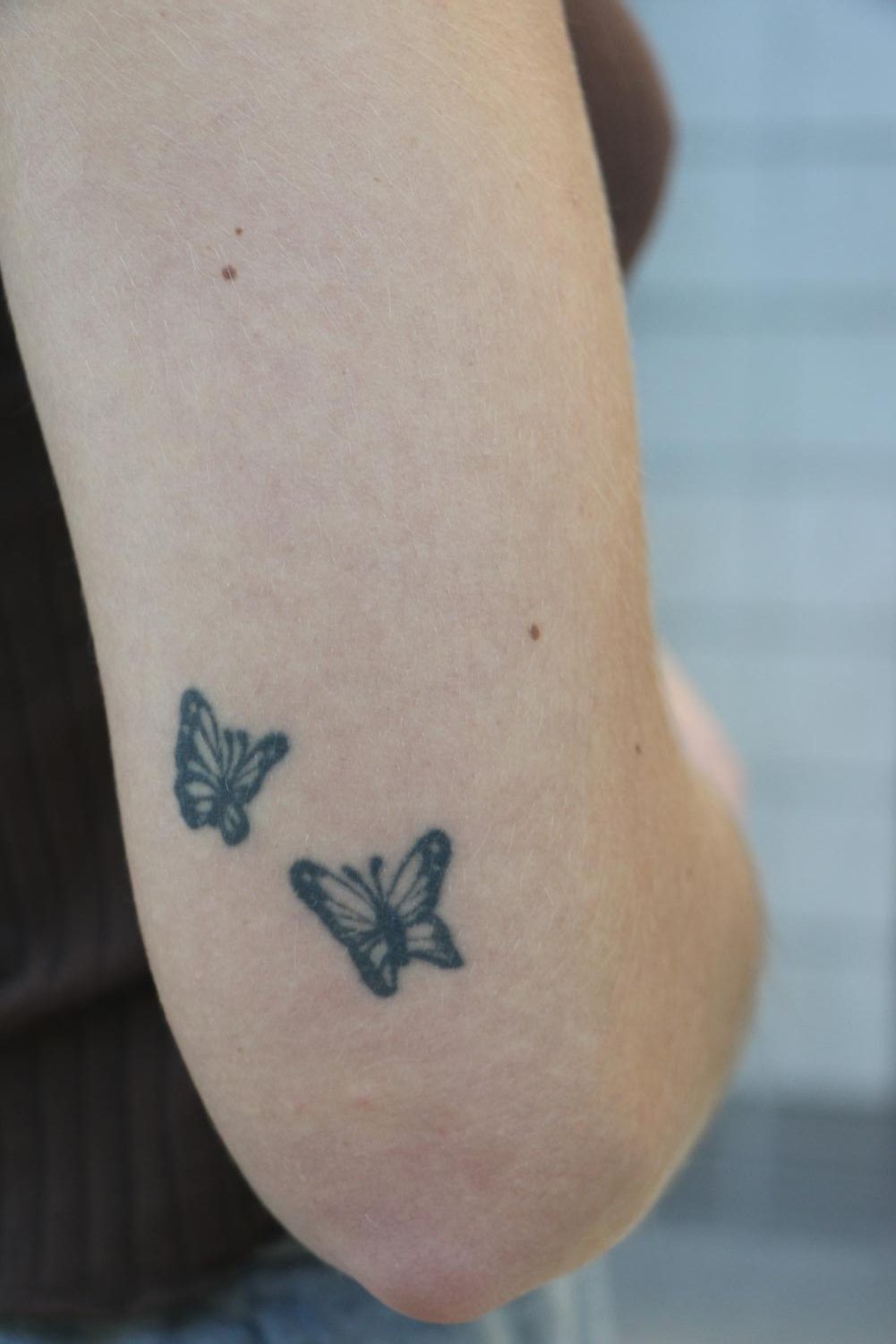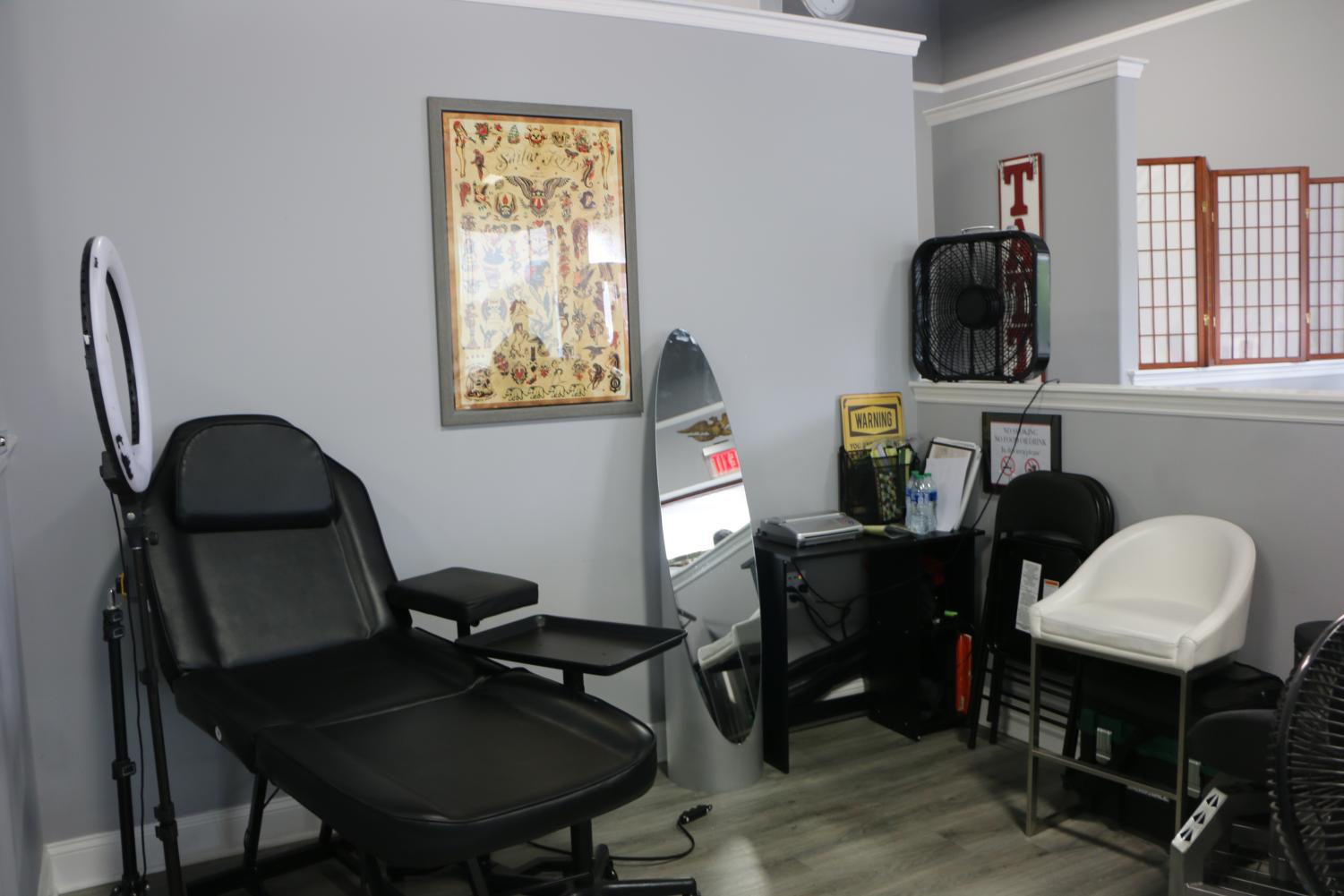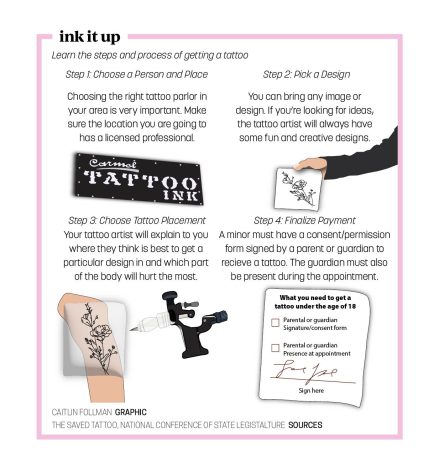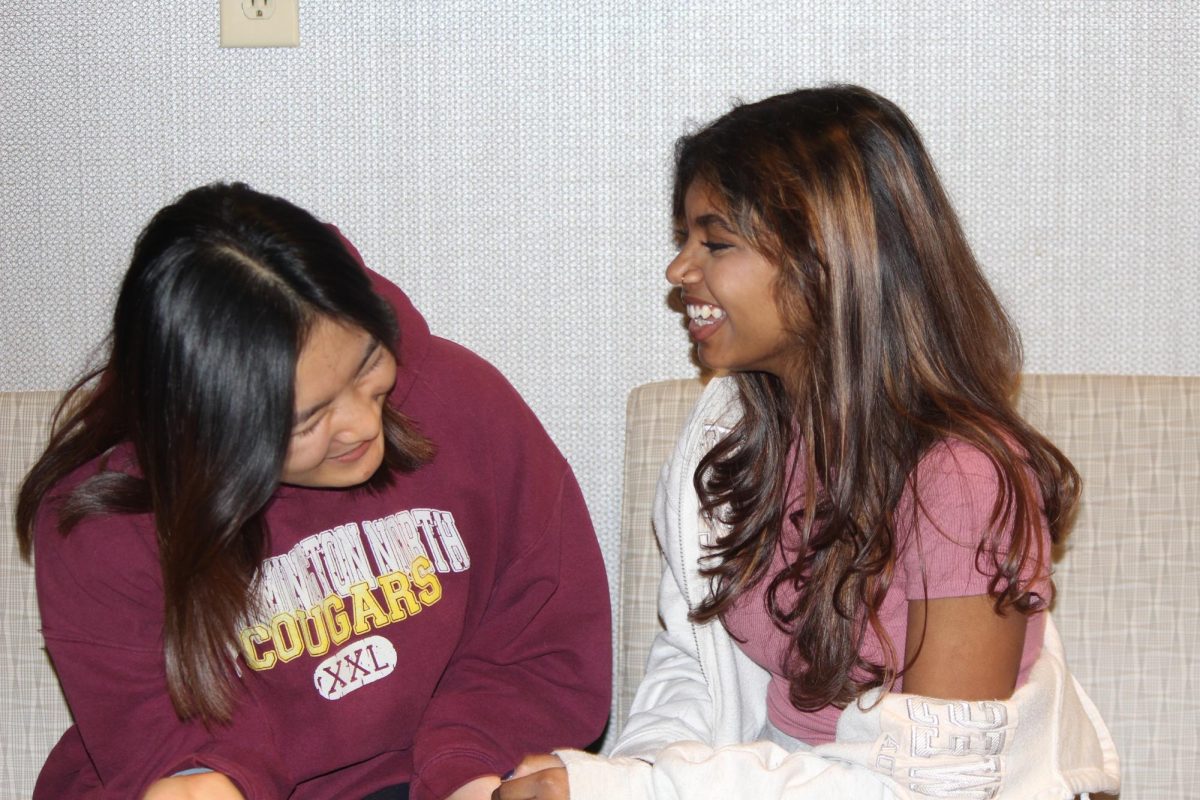While some people use their voice or writing to tell their stories, senior Sophie Esposito uses her tattoos—one of butterflies and one of the word “balance.” She said both tattoos hold significant meaning to her.

“The butterflies on the back of my right arm (are) for my aunt who passed away a couple years ago. I feel like it’s like a symbol for her, like, ‘Your death was not meaningless; you still make an impact even though you’re not here,’” she said. “My tattoo on my left bicep says ‘balance.’ I was going through a really tough part of my life so it’s kind of a reminder for me to keep my life balanced, like, ‘You have to feel everything, but you don’t let it take control of you.’”
Like Esposito, junior Caroline Miller also has a tattoo in memory of a loved one.
“My tattoo is in memory of my brother; he passed away my freshman year. My tattoo is a lyric from a song that is connected to a memory I have of him,” Miller said. “A lot of my brother’s friends also got tattoos to remember him and when I saw them get that, it just really connected with me to have a permanent, everyday reminder that I could look at to remember him and the happiness that he brought everyone.”
Esposito and Miller’s tattoos reflect the growing popularity of tattoos among all age groups. According to a study by the University of Michigan, 25% of parents of high school students said their child had asked for consent to get a tattoo. In Indiana, tattoo artists are not allowed to tattoo minors without written parental consent.

Despite these restrictions, Adam French, tattoo artist and owner of Carmel Tattoo Ink, said someone’s age should not discourage them from getting a tattoo.
“I’ve tattooed someone as young as 13; it was actually suggested by her family doctor for a physical deformity that we masked with a tattoo because they couldn’t do any surgery to correct it,” French said. “I think that everyone who can get permission should have a tattoo within reason. I’m not saying 10-year-olds should be walking around with tattoos, but if it’s an appropriate tattoo and their parents are okay with it, then (why not)?”
However, Miller said people, especially high school students, should consider possibilities of regret before getting a tattoo.
“For me, since I am 16, I thought about my tattoo for a really long time to make sure I really wanted it and I wouldn’t regret it in a couple of years. I wanted (my tattoo) to be somewhere where if I needed to, I could cover it up since I have a lot of my life ahead of me,” Miller said.
But, at the same time, Zach Boyer, tattoo artist at Carmel Tattoo Ink, said he doesn’t necessarily regret getting the tattoos he no longer likes because they still represent a memory from his past.
“The way I look at tattoos (is that) you only have to like it one time no matter what you get; I think of it more like a scrapbook,” Boyer said. “I have tattoos I don’t like but when I think about them, I think about being 18 and what I was going through when I was that age.”
Still, French and Boyer said they acknowledge the stigma around tattoos especially in the workplace and try to help younger clients make better choices.
“If a 16- or 17-year-old person wanted to get something tattooed on their hand, we would probably turn them away and not do it,” French said. “You’ve got your whole life ahead of you and you’ve got jobs to try to obtain. Even though those barriers are breaking down, it’s still a thing. Why make things difficult for yourself?”

Furthermore, Esposito said some people had a different impression of her because she has tattoos.
She said, “Some of my friends or people I meet after I’ve gotten my tattoo have told me, ‘Oh, you kind of came off as intimidating because you have tattoos,’ and I’m like, ‘No, I’m the least intimidating person you could meet.’”
Along those lines, Boyer said he has encountered people who have a stereotypical view of him because he has tattoos.
“(People think) we’re all criminals or that we didn’t go to college. There was a girl that came in here that just assumed I never went to college. I went to college twice. We can be educated and have tattoos,” he said. “If you’re a good person, it makes no difference (whether) you have tattoos or not.”
Ultimately, in light of National Tattoo Story Day on Sept. 16, both Esposito and Miller said they hope more people destigmatize tattoos and instead, see tattoos as a way to symbolize experiences.
“Tattoos, even meaningless ones, are just a way to express yourself in a different form. People see me—not as different—but they see different parts of me they wouldn’t see if I didn’t have a tattoo,” Esposito said. “When I tell people the story behind my butterfly tattoo (and) about my aunt and how she left an impact on me, it makes them feel better because it makes them not take life (for) granted as much.”
To add on, Miller said people should also seek to understand the story behind someone’s tattoo before stereotyping someone.

“A lot of times people are scared to come up and talk to me about my brother so when people ask (about my tattoo), I’m able to tell them the story of like, ‘Oh, it’s actually in memory of my brother’ and it helps me just carry on his legacy a little bit more,” Miller said. “I just want people to think about what others have gone through that they haven’t before judging someone based on their tattoos. You never know what someone has gone through and what a tattoo means to them.”



















![Joseph Broman, Mu Alpha Theta sponsor, grades tests for his honors precalculus/trigonometry class. Broman said, “I’m retiring from the Math Club next year and I’m just going to do Mu Alpha Theta so I can focus on that one and we can do more [speaker series] first semester.”](https://hilite.org/wp-content/uploads/2024/03/IMG_9502-1200x900.jpg)











![British royalty are American celebrities [opinion]](https://hilite.org/wp-content/uploads/2024/03/Screenshot-2024-03-24-1.44.57-PM.png)




















![Review: “The Iron Claw” cannot get enough praise [MUSE]](https://hilite.org/wp-content/uploads/2024/04/unnamed.png)
![Review: “The Bear” sets an unbelievably high bar for future comedy shows [MUSE]](https://hilite.org/wp-content/uploads/2024/03/unnamed.png)
![Review: “Mysterious Lotus Casebook” is an amazing historical Chinese drama [MUSE]](https://hilite.org/wp-content/uploads/2024/03/0.webp)
![Thea Bendaly on her Instagram-run crochet shop [Biz Buzz]](https://hilite.org/wp-content/uploads/2024/03/IMG_0165-1200x838.jpg)
![Review: Sally Rooney’s “Normal People,” is the best book to read when you are in a time of change [MUSE]](https://hilite.org/wp-content/uploads/2024/03/20047217-low_res-normal-people.webp)
![Review in Print: Maripaz Villar brings a delightfully unique style to the world of WEBTOON [MUSE]](https://hilite.org/wp-content/uploads/2023/12/maripazcover-1200x960.jpg)
![Review: “The Sword of Kaigen” is a masterpiece [MUSE]](https://hilite.org/wp-content/uploads/2023/11/Screenshot-2023-11-26-201051.png)
![Review: Gateron Oil Kings, great linear switches, okay price [MUSE]](https://hilite.org/wp-content/uploads/2023/11/Screenshot-2023-11-26-200553.png)
![Review: “A Haunting in Venice” is a significant improvement from other Agatha Christie adaptations [MUSE]](https://hilite.org/wp-content/uploads/2023/11/e7ee2938a6d422669771bce6d8088521.jpg)
![Review: A Thanksgiving story from elementary school, still just as interesting [MUSE]](https://hilite.org/wp-content/uploads/2023/11/Screenshot-2023-11-26-195514-987x1200.png)
![Review: When I Fly Towards You, cute, uplifting youth drama [MUSE]](https://hilite.org/wp-content/uploads/2023/09/When-I-Fly-Towards-You-Chinese-drama.png)
![Postcards from Muse: Hawaii Travel Diary [MUSE]](https://hilite.org/wp-content/uploads/2023/09/My-project-1-1200x1200.jpg)
![Review: Ladybug & Cat Noir: The Movie, departure from original show [MUSE]](https://hilite.org/wp-content/uploads/2023/09/Ladybug__Cat_Noir_-_The_Movie_poster.jpg)
![Review in Print: Hidden Love is the cute, uplifting drama everyone needs [MUSE]](https://hilite.org/wp-content/uploads/2023/09/hiddenlovecover-e1693597208225-1030x1200.png)
![Review in Print: Heartstopper is the heartwarming queer romance we all need [MUSE]](https://hilite.org/wp-content/uploads/2023/08/museheartstoppercover-1200x654.png)























![Review: Ladybug & Cat Noir: The Movie, departure from original show [MUSE]](https://hilite.org/wp-content/uploads/2023/09/Ladybug__Cat_Noir_-_The_Movie_poster-221x300.jpg)

![Review: Next in Fashion season two survives changes, becomes a valuable pop culture artifact [MUSE]](https://hilite.org/wp-content/uploads/2023/03/Screen-Shot-2023-03-09-at-11.05.05-AM-300x214.png)
![Review: Is The Stormlight Archive worth it? [MUSE]](https://hilite.org/wp-content/uploads/2023/10/unnamed-1-184x300.png)


